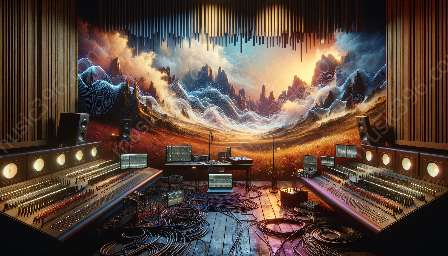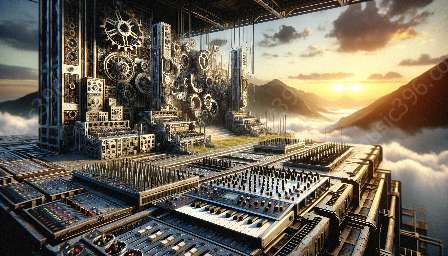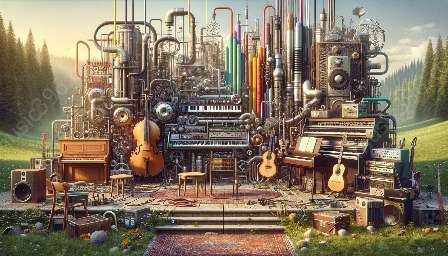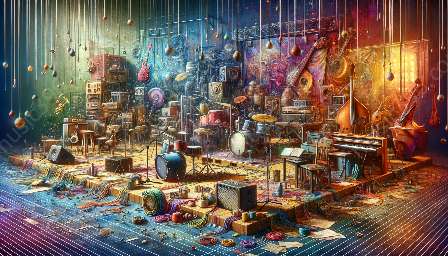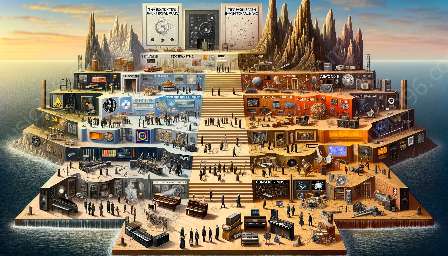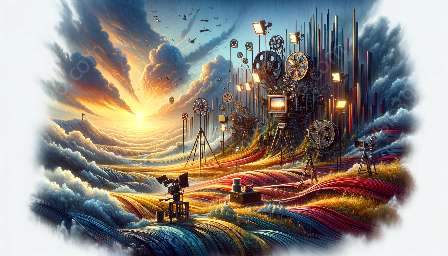Industrial music has long been a source of inspiration for innovative sound engineering and production techniques. This article explores the influence of industrial music on pushing the boundaries of music production, as well as its relationship to experimental and industrial music.
Understanding Industrial Music
To comprehend how industrial music inspires innovative approaches to sound engineering and production, it is important to understand the genre itself. Industrial music is characterized by its harsh, electronic sounds, unconventional instrumentation, and experimental song structures. Emerging in the 1970s and 1980s, industrial music often incorporates elements of noise, avant-garde, and electronic music. Bands like Throbbing Gristle, Einstürzende Neubauten, and Skinny Puppy have been pivotal in shaping the genre's sonic landscape.
Embracing Non-Traditional Soundscapes
Industrial music challenges conventional norms by embracing non-traditional soundscapes. This outlook encourages sound engineers and producers to think outside the box. By incorporating unconventional sound sources such as industrial machinery, field recordings, and manipulated audio, industrial music blurs the lines between music and noise. This push towards non-traditional soundscapes has inspired a wave of innovation in sound engineering, prompting producers to experiment with unorthodox recording and manipulation techniques.
Experimentation and Deconstruction
An essential aspect of industrial music is its emphasis on experimentation and deconstruction. This ethos extends to sound engineering and production, where the norm is to push boundaries and challenge established methods. Industrial music inspires engineers and producers to explore new ways of shaping and manipulating sound. From the use of modular synthesis to granular synthesis, industrial music has driven the development of innovative tools and techniques that continue to reshape the production landscape.
Adopting a DIY Mentality
Industrial music has a strong association with the DIY (do-it-yourself) ethos, encouraging artists to create their own sonic toolkit. This approach has significantly impacted sound engineering and production, as it promotes the development of custom instruments, effects, and processing methods. The spirit of industrial music inspires engineers to create and innovate, leading to the emergence of unique and unconventional sonic palettes.
Pushing Boundaries in Mixing and Mastering
Industrial music's abrasive and intense sonic characteristics have influenced the way mixing and mastering techniques are approached. The genre's penchant for distortion, extreme dynamics, and unconventional textures has spurred the development of innovative mixing and mastering processes. Engineers have been compelled to rethink traditional practices and adopt unconventional methods to capture the essence of industrial music while maintaining sonic integrity.
Integration of Technology and Production
Industrial music has always been at the forefront of integrating technology into the production process. From early experimentation with analog synthesizers and tape manipulation to the latest advancements in digital audio processing and virtual instruments, industrial music has driven technological innovation in sound engineering. The seamless integration of technology and production has allowed for the creation of futuristic sonic landscapes, further inspiring the evolution of experimental and industrial music.
Evolving Aesthetics and Sonic Landscapes
Through its distinctive sonic aesthetics, industrial music has reshaped the sonic landscapes of music production. By embracing dissonance, distortion, and unconventional tonalities, industrial music has influenced the creation of new sonic palettes. This evolution in sonic aesthetics has inspired sound engineers and producers to rethink traditional approaches and experiment with new sonic possibilities, ultimately contributing to the innovation of sound engineering and production.
Emergence of Post-Industrial Sound
The influence of industrial music has transcended its original boundaries, giving rise to the emergence of post-industrial sound. This evolution has spurred experimentation with hybrid genres, blending industrial elements with other musical styles. As a result, sound engineering and production have been influenced by the fusion of industrial music with diverse genres, leading to the exploration of uncharted sonic territories and challenging traditional production paradigms.
Conclusion
Industrial music continues to inspire innovative approaches to sound engineering and production by challenging norms, embracing experimentation, and reshaping sonic aesthetics. As the genre evolves, its influence on the evolution of experimental and industrial music becomes increasingly apparent, driving the continuous innovation in sound engineering and production.











